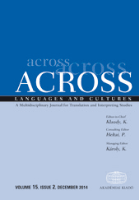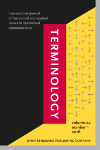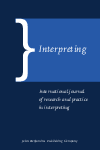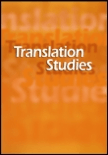
Across Languages and Cultures
Scope & Guideline
Navigating the Richness of Language Across Cultures
Introduction
Aims and Scopes
- Translation Competence and Performance:
The journal emphasizes the study of translation competence, exploring the cognitive and practical skills necessary for effective translation and interpreting. - Cultural and Sociolinguistic Factors:
Research often investigates how sociocultural contexts influence language use and communication strategies in translation and interpreting, highlighting the interplay between culture and language. - Methodological Innovations in Translation Studies:
The journal promotes methodological advancements, including empirical studies and systematic reviews, that enhance the understanding of translation processes and practices. - Technological Integration:
There is a consistent focus on the role of technology in translation and interpreting, including machine translation, remote interpreting, and the use of digital tools for enhancing translation quality. - Multimodal and Interdisciplinary Approaches:
The journal encourages interdisciplinary research that incorporates perspectives from linguistics, communication studies, and cognitive sciences to enrich translation studies. - Training and Pedagogy:
Research on translator and interpreter training methods is a significant area, focusing on best practices and the development of competencies among students and professionals.
Trending and Emerging
- Sociocultural Influences on Communication:
Recent publications have increasingly focused on how sociocultural factors impact health communication and other forms of discourse, highlighting the importance of context in translation. - Technological Advances in Translation and Interpreting:
The rise of machine translation and remote interpreting technologies has become a prominent area of research, with studies examining their implications for practice and ethics. - Cognitive Processes in Translation:
There is a growing interest in understanding the cognitive processes underlying translation and interpreting, including working memory, decision-making, and cognitive load. - Multimodal Analysis:
Emerging research is exploring multimodal approaches to translation, analyzing how different modes of communication (textual, visual, auditory) interact in the translation process. - Interdisciplinary Research:
The journal is witnessing an increase in interdisciplinary studies that draw on insights from fields such as psychology, sociology, and technology to inform translation and interpreting practices.
Declining or Waning
- Traditional Literary Translation:
Research focusing solely on traditional literary translation practices has decreased, as the field increasingly emphasizes interdisciplinary approaches and the integration of technology. - Static Translation Theories:
There has been a move away from static models of translation theory towards more dynamic and context-sensitive approaches, indicating a waning interest in rigid theoretical frameworks. - Historical Studies of Translation:
While historical perspectives remain important, the frequency of papers dedicated solely to historical analysis of translation practices has diminished in favor of contemporary issues and technology-driven research. - Translation of Non-Contemporary Texts:
The exploration of translations of non-contemporary or classical texts is less prevalent, as current research trends favor modern texts and applications in real-world contexts.
Similar Journals

Terminology
Navigating the Complexities of Language and Information ScienceTerminology is a highly regarded journal published by John Benjamins Publishing Co, focusing on the multidisciplinary fields of communication, library and information sciences, and linguistics. Since its inception, the journal has provided a platform for rigorous research and innovative discussions surrounding the theory and practice of terminology, shedding light on its significance in effective communication and knowledge organization. With its Q2 ranking in the 2023 quartiles for communication and linguistics, and an impressive 78th percentile ranking in language and linguistics according to Scopus, Terminology stands as an influential resource for scholars and practitioners alike. Although not an open access journal, it is committed to enhancing the visibility and dissemination of critical academic work. The journal's comprehensive scope includes empirical studies, critical reviews, and theoretical explorations from 1994 to 2024, making it a vital resource for researchers, professionals, and students seeking to advance their understanding of linguistic practices and terminological challenges in an increasingly interconnected world.

Interpreting
Unveiling the complexities of communication and interpretation.Interpreting is a prestigious academic journal published by John Benjamins Publishing Co, specializing in the dynamic field of linguistics and language studies. With an ISSN of 1384-6647 and an E-ISSN of 1569-982X, this journal has established itself as a leading platform for researchers and professionals dedicated to the exploration of interpreting as a critical aspect of communication across cultures. Notably, it has earned a remarkable Q1 classification in the linguistics and language category for 2023, ranking 45th out of 1088 in the Arts and Humanities domain, and 54th out of 1167 in the Social Sciences. The journal's five-year convergence periods from 1996 to 2000 and 2004 to 2024 reflect its commitment to ongoing research and development in interpreting studies. Although not open access, the journal’s wide-reaching impact and significant contributions, underscored by its 95th percentile ranking in both fields, ensure that vital research findings are accessible to scholars, offering insights that are pivotal for advancing understanding and practices in interpreting. Based in Amsterdam, Netherlands, Interpreting continues to be a cornerstone for advancing theoretical and practical knowledge in the field.

RAEL-Revista Electronica de Linguistica Aplicada
Bridging Linguistics and Practical SolutionsRAEL-Revista Electronica de Linguistica Aplicada, published by the ASOC ESPANOLA LINGUISTICA APLICADA-AESLA, is a prominent open access journal that has been serving the field of applied linguistics since its inception in 2002. With a dedicated focus on the interplay between language and its practical applications in various contexts, the journal aims to disseminate high-quality research and foster academic discourse among linguists, educators, and policy makers alike. Based in Spain at the Universidad Politécnica de Valencia, RAEL is indexed in Scopus and offers access to a global readership. With a current impact factor reflecting its esteem in the fields of Education, Linguistics, and Social Sciences, the journal ranks in Q3 for linguistics and has achieved significant positioning within its categories. Researchers and students seeking to explore applied linguistic phenomena will find valuable insights and diverse perspectives in its published articles, making RAEL a vital resource in the pursuit of knowledge advancement in this dynamic discipline.

Trans-Revista de Traductologia
Advancing the Frontiers of Translation StudiesTrans-Revista de Traductologia, an esteemed journal in the realm of Translation Studies and Linguistics, is published by the University of Malaga's Faculty of Philosophy and Letters. With an Open Access model since 2015, it facilitates the global dissemination of research and findings, supporting the academic community and enhancing visibility for scholars. The journal spans research from 2012 to 2023 and has achieved a commendable Q2 ranking in the Linguistics and Language category for 2023, signifying its growing influence within the field. Its Scopus rankings reflect its competitive edge, positioned at #484 in Arts and Humanities as well as #565 in Social Sciences, as it continues to foster a platform for innovative and interdisciplinary investigation in language dynamics, translation practices, and cultural exchanges. Scholars, professionals, and students alike will find a rich resource within its pages to explore both theoretical frameworks and practical applications in translation.

Revista Espanola de Linguistica Aplicada
Advancing linguistic insights for a global audience.Revista Espanola de Linguistica Aplicada is a prominent academic journal published by John Benjamins Publishing Co, specializing in the interdisciplinary fields of linguistics, education, and e-learning. With its ISSN 0213-2028 and E-ISSN 2254-6774, the journal has established a significant presence in Spain and beyond, showcasing innovative research and contributions in applied linguistics. The journal is recognized for its rigorous peer-review process and maintains impressive Scopus rankings, notably within the 72nd percentile for Arts and Humanities and 68th percentile for Social Sciences, reflecting its critical role in advancing the study of language and education. As of 2023, it holds a Q3 rank in Education and a Q2 rank in Linguistics and Language, underscoring its influence and relevance in these disciplines. Targeted at researchers, educators, and students alike, the journal aims to facilitate knowledge exchange and provide a platform for discussions that shape the future of linguistics.

Quaderns-Revista de Traduccio
Unveiling the Art of Translation ExcellenceQuaderns-Revista de Traduccio, published by the Universitat Autònoma de Barcelona, is a prominent journal in the field of Linguistics and Language, which has garnered recognition for its scholarly contributions since its inception. With an ISSN of 1138-5790 and an E-ISSN of 2014-9735, this journal has maintained an active publication schedule across notable cycles, contributing valuable insights from 2011 to 2018 and continuing from 2020 to 2024. As a Q3 category journal in both Arts and Humanities and Social Sciences related to Language and Linguistics, it occupies an important niche, ranking #607 out of 1088 and #692 out of 1167 respectively. Though currently not an open-access journal, its rigorous peer-review process ensures that published articles meet high academic standards, making them relevant for researchers, professionals, and students alike. Housed in Cerdanyola del Vallès, Barcelona, this journal serves as a critical platform for the dissemination of cutting-edge translation studies and linguistics research.

Eurasian Journal of Applied Linguistics
Bridging Cultures Through Language InsightsThe Eurasian Journal of Applied Linguistics, published by Hacettepe University, ELT Department, is a distinguished open-access journal that has been contributing to the fields of linguistics and language education since 2015. With a focus on bridging cultural and linguistic understandings across Eurasia, this journal provides a platform for researchers, educators, and practitioners to share cutting-edge studies, innovative pedagogical strategies, and insightful analyses. The journal holds notable Scopus rankings within the Language and Linguistics (Rank #155/1088, 85th Percentile) and Education (Rank #696/1543, 54th Percentile) categories, evidencing its growing impact within the academic community. As it prepares to converge into a new phase from 2018 to 2024, the Eurasian Journal of Applied Linguistics aims to uphold its mission of fostering interdisciplinary dialogue and advancing knowledge in applied linguistics and its related fields.

Cadernos de Traducao
Advancing translation scholarship for a global audience.Cadernos de Tradução, published by the Universidade Federal de Santa Catarina, is an esteemed open-access journal dedicated to fostering scholarship in the fields of Language, Linguistics, and Literature. Since its inception in 1996, this journal has emerged as a vital platform for research, particularly known for its rigorous peer-review process and commitment to academic excellence. With a Q2 ranking in Linguistics and Language and a Q1 ranking in Literature and Literary Theory as of 2023, it stands out in the global academic landscape, holding significant positions in Scopus rankings across various categories. Researchers, professionals, and students will find a wealth of interdisciplinary studies that contribute to current discussions and advancements in translation theory and practice. The journal's open-access model enhances visibility, ensuring that groundbreaking research is accessible to a wide audience, thus promoting dialogue and collaboration within the international academic community.

Translation Studies
Unlocking the Secrets of Translation and InterpretationTranslation Studies is a premier journal in the field of linguistics and language, published by Routledge Journals, Taylor & Francis Ltd, and is recognized for its exceptional impact within the academic community, boasting a Q1 classification in Linguistics and Language as of 2023. With its ISSN 1478-1700 and E-ISSN 1751-2921, this journal serves as an eminent platform for disseminating groundbreaking research, theoretical advancements, and practical applications related to translation and interpreting studies. Covering a comprehensive scope, the journal publishes original research articles, critical reviews, and theoretical discussions, making significant contributions to both the arts and humanities as well as social sciences. The journal is published in the United Kingdom and has maintained a solid reputation from its inception in 2008 through to 2024. Positioned within the top ranks of Scopus in both the language and linguistics categories, it ensures visibility, making it an essential resource for scholars, practitioners, and students who wish to stay informed of the latest trends, methodologies, and discussions in translation studies.

Onomazein
Charting New Territories in Linguistic ResearchOnomazein is an esteemed academic journal published by the Pontificia Universidad Catolica de Chile, Facultad de Letras, featuring a dedicated focus on the field of Linguistics and Language. With an established presence since 2011, it reaches an international audience and is recognized for its contributions within the Q2 category of Linguistics as per the latest rankings, underscoring its significance in the academic community. The journal holds a commendable position in Scopus, ranking 470th out of 1088 in Arts and Humanities and 549th out of 1167 in Social Sciences, reflecting its relevance and impact in the domain. Although it does not currently offer an open access option, Onomazein remains a critical platform for researchers, professionals, and students seeking to advance their understanding of linguistic phenomena and engage with contemporary debates in language studies. For submissions and more information, please refer to the university’s address at AV Vicuna Mackenna 4860, Santiago, Chile.